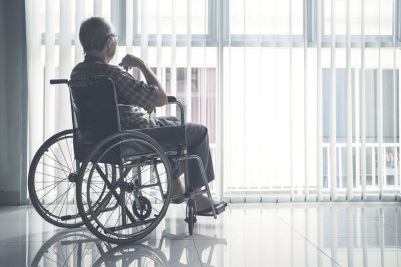SUPREME COURT CASE ON INDIANA PUBLIC NURSING HOMES COULD SHARPLY LIMIT DISABILITY RIGHTS
A case going before the U.S. Supreme Court could severely threaten the rights of millions of people who rely on Medicaid, SNAP, CHIP and other government programs.
The question before the court is whether beneficiaries of programs like Medicaid have the right to sue state and local governments if their civil rights are violated, or if they have any form of recourse at all.
Gorgi Talevski was living with dementia and receiving care at Valparaiso Care and Rehabilitation, a state-run nursing facility in Indiana. His wife, Ivanka Talevski, filed a lawsuit on behalf of her husband alleging that Valparaiso Care failed to provide Gorgi with adequate medical care, used psychotropic medications as unnecessary chemical restraint, and improperly discharged and transferred him, among other practices, in violation of the Federal Nursing Home Reform Act (FNHRA).

ROLLING BACK RIGHTS: Medicaid is the primary source of health care for people with intellectual or developmental disabilities, the vast majority of whom want to live with dignity in their homes and communities.
The case, known as Talevski v. Health and Hospital Corporation of Marion County, was brought by the estate of Gorgi Talevski, who has since died, alleging that he was chemically restrained and medicated so that he would go to sleep instead of being treated for his dementia while living in an Indiana nursing home.
"The implications of this case reach far beyond Talevski and nursing home standards of care. Safety net programs have been a lifeline for millions of people, especially people with disabilities."
The United States Court of Appeals for the Seventh Circuit determined that Talevski's estate could sue under the Nursing Home Reform Act provisions of Medicaid, but the Health and Hospital Corporation of Marion County, or HHC, appealed to the Supreme Court arguing that nursing home residents shouldn't be able to bring suit in federal court.
On Nov. 8, Talevski v. Health and Hospital Corporation of Marion County will be heard by the Supreme Court. The implications of this case reach far beyond Talevski and nursing home standards of care. Safety net programs – such as Medicaid, the Supplemental Nutrition Assistance Program (SNAP), the Children's Health Insurance Program (CHIP) and Temporary Assistance to Needy Families (TANF) – have been a lifeline for millions of people, especially people with disabilities. A negative ruling will leave them without any legal recourse if they face mistreatment or abuse or
their benefits are taken away or denied. This happens more often than you may think.
"With Talevski, the Supreme Court could cut off the right to go to court if state officials unlawfully deny, reduce or terminate benefits guaranteed by federal law," a petition from the Bazelon Center for Mental Health Law and a handful of organizations in Indiana that are pushing back against HHC reads. "This would make it nearly impossible to hold state and local governments accountable for violating the rights of those depending on federally funded safety net programs."
The impact would be far reaching, advocates say, affecting millions of people who rely on everything from Medicaid to the Supplemental Nutrition Assistance Program, the Children’s Health Insurance Program, Temporary Assistance to Needy Families and more.
Disability advocates say the case could also influence the right to sue under Title IX of the Education Amendments of 1972, which bars discrimination based on sex, as well as Title VI of the Civil Rights Act, which speaks to discrimination based on race, color or national origin, and Section 504 of the Rehabilitation Act, which prohibits disability discrimination.
"This case is a large-scale assault on disability rights around the country," said Peter Berns, CEO of The Arc. "Medicaid is the primary source of health care for people with intellectual or developmental disabilities, the vast majority of whom want to live with dignity in their homes and communities. Protecting their right to private action when such rights are violated would ensure they aren't unnecessarily institutionalized and prevent the unraveling of antidiscrimination progress set forth by the ADA for over 30 years."
In recent weeks, advocates are pressuring HHC to drop the case. More than 20 amicus briefs supporting the Talevski estate have been filed by groups including the Bazelon Center, The Arc, the American Association of People with Disabilities, AARP and top Democrats in Congress.
Jalyn Radziminski at the Bazelon Center said more than 13,000 people have emailed HHC and Marion County elected officials urging them to withdraw the matter. Meanwhile, an amicus brief from a long-term care industry group as well as one filed by Indiana and 16 other states are backing HHC.
Jane Perkins, legal director at the National Health Law Program, which filed an amicus brief along with 42 other legal organizations supporting Talevski. said "This case is no joke. An adverse decision will have huge implications for government program beneficiaries and for holding governments accountable."